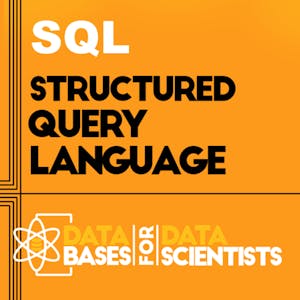The Structured Query Language (SQL)
In this course you will learn all about the Structured Query Language (“SQL”.) We will review the origins of the language and its conceptual foundations. But primarily, we will focus on learning all the standard SQL commands, their syntax, and how to use these commands to conduct analysis of the data within a relational database. Our scope includes not only the SELECT statement for retrieving data and creating analytical reports, but also includes the DDL (“Data Definition Language”) and DML (“Data Manipulation Language”) commands necessary to create and maintain database objects.The Structured Query Language (SQL) can be taken for academic credit as part of CU Boulder’s Master of Science in Data Science (MS-DS) degree offered on the Coursera platform. The MS-DS is an interdisciplinary degree that brings together faculty from CU Boulder’s departments of Applied Mathematics, Computer Science, Information Science, and others. With performance-based admissions and no application process, the MS-DS is ideal for individuals with a broad range of undergraduate education and/or professional experience in computer science, information science, mathematics, and statistics. Learn more about the MS-DS program at https://www.coursera.org/degrees/master-of-science-data-science-boulder
.
The origins and historical basis for SQL
Standard SQL use and syntax
How to code SQL queries in order to analyze data stored in relational databases
Syllabus
Syllabus - What you will learn from this course
Week 1
Introduction to SQL - Structured Query Language
Week 2
The Basic SELECT Statement
Week 3
Group Functions, SubTotals, and Subqueries
Week 4
Getting Data from Multiple Tables
Week 5
DDL and DML
Week 6
Advanced SQL Commands
FAQ
When will I have access to the lectures and assignments?
Access to lectures and assignments depends on your type of enrollment. If you take a course in audit mode, you will be able to see most course materials for free. To access graded assignments and to earn a Certificate, you will need to purchase the Certificate experience, during or after your audit. If you don't see the audit option:
What will I get if I subscribe to this Specialization?
When you enroll in the course, you get access to all of the courses in the Specialization, and you earn a certificate when you complete the work. Your electronic Certificate will be added to your Accomplishments page - from there, you can print your Certificate or add it to your LinkedIn profile. If you only want to read and view the course content, you can audit the course for free.
Is financial aid available?
Yes. In select learning programs, you can apply for financial aid or a scholarship if you can’t afford the enrollment fee. If fin aid or scholarship is available for your learning program selection, you’ll find a link to apply on the description page.
Reviews
Excellent course. The instructor took the time to teach SQL in a comprehensive way and the labs and quizes are very well prepared to help with the learning.
Great to begin with and good for students trying to learn SQL Basics
This was an excellent course that taught everything one needs to know about the use of SQL. The teachers was didactically excellent.
A very comprehensive course for the basic understanding course of SQL. Recommended
